Jackie Sherrill: Inside A Legendary Coach's Forever Changing of Aggieland

"Coach, do you want a beer?"
As Brian Carpenter sat amongst a group of his 12th Man Kickoff Team buddies — their backs against the 55-foot bonfire the building of which had become a yearly tradition for the Corps of Cadets and any interested student body members — they laughed and joked an otherwise calm night away.
Constructing anything that tall certainly called for intermittent breaks, and Carpenter and his buddies weren't shy about using them, enjoying what he called "beverages" in the process. But as they looked around the area, which was buzzing with students excited to complete another year of the annual bonfire, they noticed something unusual. Or someone, to be more specific.
Above them, on one of the upper levels of logs used to build the bonfire, was their football coach: Jackie Sherrill.
"We were all sitting on the ground with our backs leaning on one of the large logs," Carpenter said. "Then, someone looked up and Coach was standing over us. The only thing anybody could think to ask was 'Coach, do you want a beer?' He just smiled, told us to be safe and walked closer to the bonfire to be raised up on the fourth stack."
Sherrill wasn't just "another Aggie coach." He didn't want to be.
He wasn't going to be.
That's why he agreed to be present the night of the bonfire's construction — a rarity for any faculty member, let alone the head football coach — and on a whim.
"Working on the bonfire, [happened because] there was one player that burst into my office," Sherrill said. "He didn't even say 'Hello.' He just burst in. And he pointed at me and he said 'Do you want to be the Aggie coach, or do you want to be just another Aggie coach?' So, I took the challenge, [and] he said 'Okay, follow me.'"
Sherrill wanted to experience truly what it meant to be an Aggie. And that he did.
The coach followed his player to the site of the bonfire, and from there, was lifted to the highest point of the bonfire — an experience he said made him look like a "funny a** football coach" — and not only watched but participated in the annual tradition, which was exactly what he wanted to do.
"We all stayed and worked with Coach most of the night on the bonfire," Carpenter explained. "We only left a few hours before we needed to be at the weight room. Memories like [that] don’t happen with any coach other than Sherrill."
Thus, Sherrill's legend was born for Carpenter and his buddies that night. But while his story reached new depths for the players and students following the bonfire, his time in College Station hadn't just begun. The years preceding Carpenter's were all stories of their own, but they weren't any less special.
And as you'll come to know, Jackie Sherrill has lots of stories.

A 'Hot Shot' From Pittsburgh & Early Impressions
Jackie Sherrill's contract was almost too expensive for Texas A&M.
That isn't a statement you'll hear too often — Texas A&M Chancellor John Sharp often commends his network's "deep pockets" — but at the time, a million dollars was a lot more money than it is now. And Sherrill was demanding $1.7 million.
That was the price to grab a two-time national championship coach fresh off of his second straight win with Pittsburgh. It was steep, and Sherrill admittedly was playing hard to get, but in the moment, the Aggies didn't care.
They wanted Sherrill, so Sherrill they got.
The soon-to-be coach ended up signing a record-breaking deal worth more than $200,000 a year for six years to reach his desired amount — also making him among the richest coaches in the nation — and had it personally guaranteed by Texas A&M's former vice president, John R. Blocker.
"When I showed up [to College Station], I went straight to the board room," Sherrill recounted. "I was there for seven hours. During the interview, we talked about a lot of things, and it is true that Mr. Blocker guaranteed the contract."
Had Blocker not have made the gesture, Sherrill might not have been an Aggie, though he'd tell you a slightly different tune different than what his then-outrageous desired contract implied. He was set on being an Aggie.
"The opportunity to come to Texas A&M was one I didn't want to pass," Sherrill said.
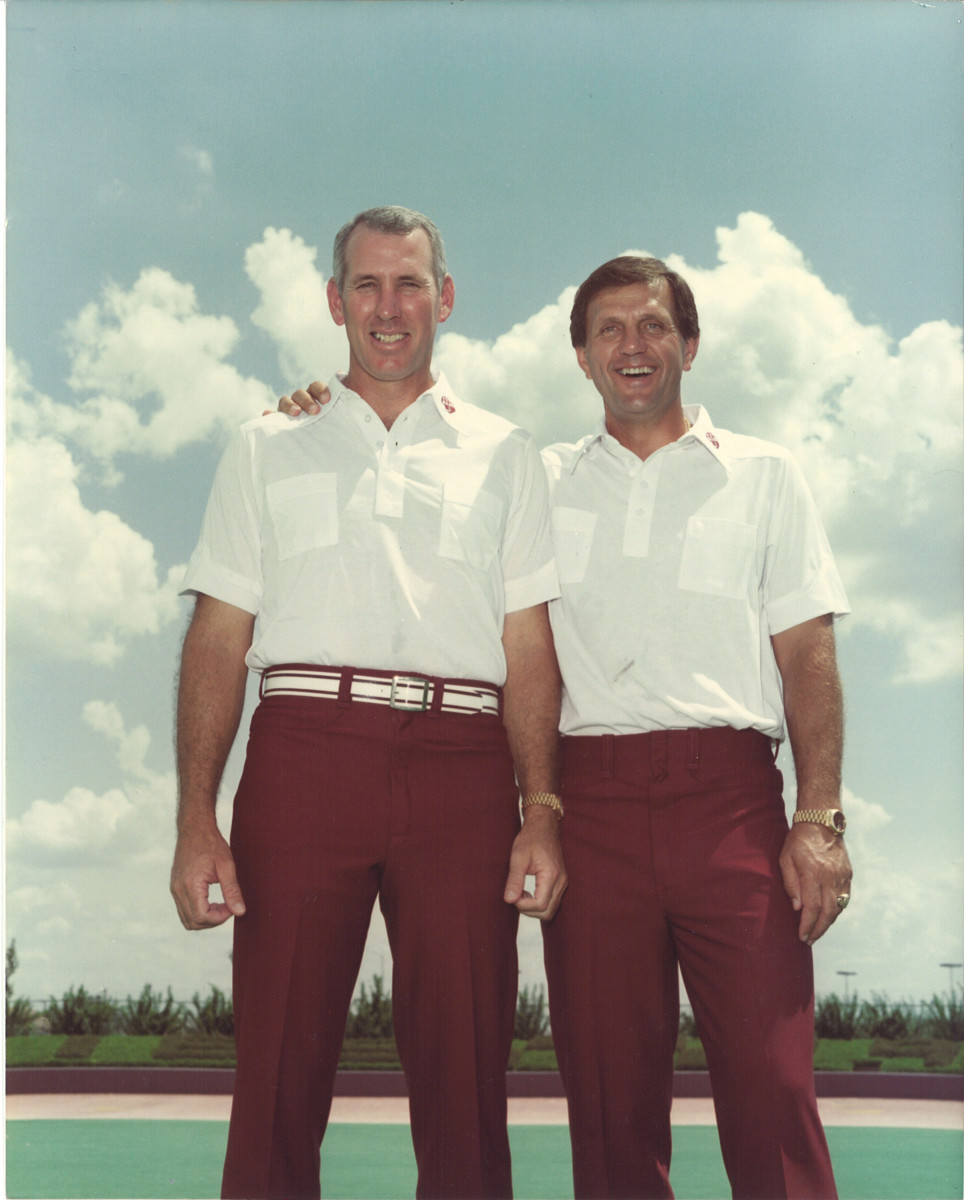
So, after seven hours and a firm handshake, the Aggies had their new coach and Sherrill had his new home in Aggieland. And so did R.C. Slocum.
"I got lucky," Sherrill said of his early days with Texas A&M. "I was able to hire R.C.. But if I had known that he [would have] walked back, I wouldn't have paid him as much as I paid him."
Slocum had already served as a coach in numerous positions for the Aggies before heading off to Southern California to coach at USC for a few seasons, so the return trip — especially once he found out Sherrill would be leading the charge — was an easy decision.
But Slocum's hiring was just another byproduct of bringing in a "hot shot" coach. Of course, the Aggies got one of the top defensive minds to lead their defense right away.
Safe to say, it wasn't well received by those outside of the Aggies' camp.
"This is overemphasis on football at its height, but so what?," Then Arkansas-Razorbacks coach Lou Holtz said publicly following Sherrill's mega-contract. "I just hope that our fans, as broadminded as they are, don't expect a poor old $40,000-a-year coach like me to be able to beat a $2 million coach like Sherrill."
Holtz was one of few to address the issue so head-on, but one of many to feel that way. Sherrill remembered it all, though none more than Penn State's Joe Paterno — the coach at the helm of his Pittsburgh-rival Penn State Nittany Lions.
"When I came here, the publicity was pretty rampant," Sherrill said. "You know, here's this hot shot guy out of Pittsburgh. He didn't deserve it. Even Coach Paterno got into it, but we quieted him down real quick."
Paterno's comments in question?
"Jackie is all wet. Give him a message for me. Tell him I'm proud of him and that if he could send a couple thousand a month up here to help a poor Italian boy, I'd be grateful."
His arguably off-handed shot at the Aggies' new coach wasn't out of the ordinary. Paterno had been known to be a hot shot himself, going as far as to say he didn't believe any other coach was making anywhere close to his yearly salary.
So, when Sherrill came along, the fire was lit. The Aggies had put themselves in a prime position to compete with a national-title coach — and paid him as such — and there was nothing Paterno could do.
In other words, if Jackie truly was "all wet," the Penn State coach put out his own flame. It was no longer going to be a hot time in Pennsylvania that night, but over in Aggieland, Sherrill's time was just beginning.
In fact, it still had a long way to go.
No Experience Required: Making the 12th Man Kickoff Team
Jackie Sherrill's focus was always on football.
And at one of the top universities in one of the nation's biggest states, that meant loads of practice. Sherrill's Aggies would practice sometimes three times a day in order to perform at the best of their ability, though, in hindsight, the coach revealed that the strenuous schedule he put his players through might have done the opposite.
"Our job as coaches is to prepare you. To make sure that we practice you, [but] I have to apologize sincerely to the 1982 team," Sherrill joked, as seriously as he could. "Honestly, I'm still upset that no one told me that we couldn't practice three times a day during August in Texas."
"We lost probably three or four games because we did that," he added. "It was my fault. I wore them out."
He was right. The first year of his coaching tenure the Aggies finished just 5-6 with a measly 3-5 conference record. Sherrill remains firm in the belief that the Aggies "could have" won several more games had it not been for the three-a-day practices, but as firm as he is in that belief, he was in his commitment to coaching football.
Distraction-free.
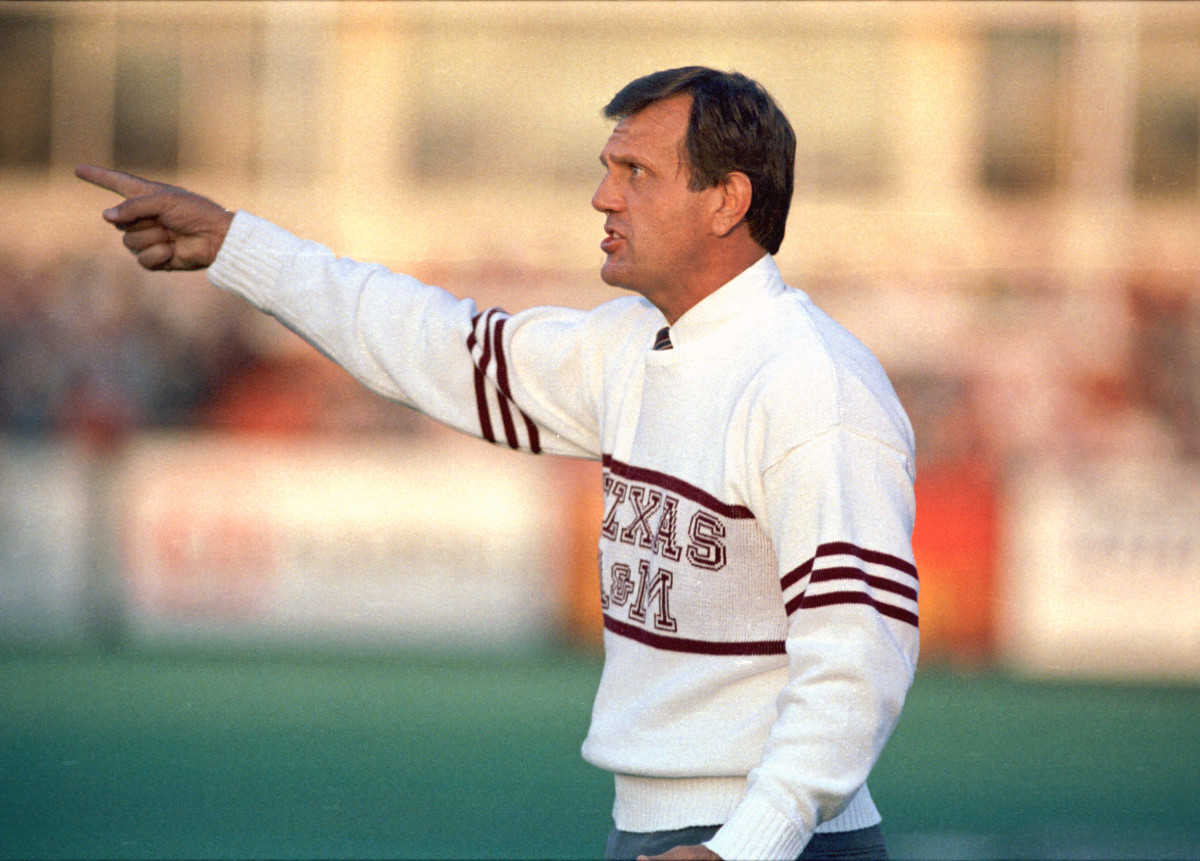
That's why when Sherrill was sitting up in the press box during one of his grueling practices to observe from a higher vantage point, an unusual mass of students forming on the un-used side of Kyle Field caught his attention. And not in a good way.
"This story was told to me many, many times during my 40-year tenure with the Aggie band," Former Senior Associate Band Director Col. Jay Brewer said. "Coach looked at [the band] and said 'What in the hell is that on the field?'
Unknown to Sherrill at the time, the group was the famous Aggie band, which also utilized the astroturf to practice drills ahead of playing at halftime of each home game. It didn't matter to the new coach, however, who only saw the group as a distraction.
So, Sherrill turned to his adviser — Billy Pickard — who also served as Texas A&M's assistant athletic director for training, equipment, and facilities, and the two went on to discuss how they were to address the unwelcome guests at practice
"[Sherrill] told Pickard 'I want it to stop,'" Brewer said. "And Pickard said 'Well Coach, you might want to think about that."
A crowd filled with long-time Aggies listening to the former director beginning to laugh said everything it needed to about the situation, but still — like he always did — Sherrill insisted. And he took Pickard to meet with the then-band director, Col. Haney.
"I will say that is a true story," Sherrill said of the long-time legend about him. "We went over there [to watch the band practice], and I said 'That's it. Let's go.' Pickard kind of looked at me [and] smiled a little bit. He said 'I thought you were going to tell the colonel [something].
"I just said 'When we become that good, we'll win the championship. Let's go.'"
It took some time before that happened for Texas A&M. By Sherrill's standards, the Aggies' football team never hit the level that their band had, but that didn't mean he didn't try. One of his ideas, however, stuck out more than the rest.
Sherrill wanted to implement an all-walk-on kickoff team. One with "no prior experience required." One made of The 12th Man.
That he did. And all it took was a simple advertisement posted to The Battalion.
"I knew that I could find, out of 40-some-odd thousand students, 11 guys that would cover kickoffs, but have no regard for their body and be tough as nails," Sherrill said. "I just knew it would work."
It wasn't long before the coach had gathered a couple hundred students interested in the position, all wanting to represent their school in an unconventional way.
Barry Stevens was one of those students.
"For four long years, I sat in the stands watching Texas A&M suffer through [football games]," Stevens said. "My frustration was really bad. I was in my senior year with the Corps of Cadets, and one evening, when I called the room to attention [during meal time], there was an announcement that came on.
"Jackie Sherrill — our new head coach — announced that in the spring of 1983, he was going to be having trials for an all-volunteer, non-scholarship kickoff team."
The idea behind it was to find students who cared enough about the football team to want to help out but also recognized what the position called for. They wouldn't be receiving money for college, nor any kind of grace from their rigorous courses.
But they wanted to be there anyway.
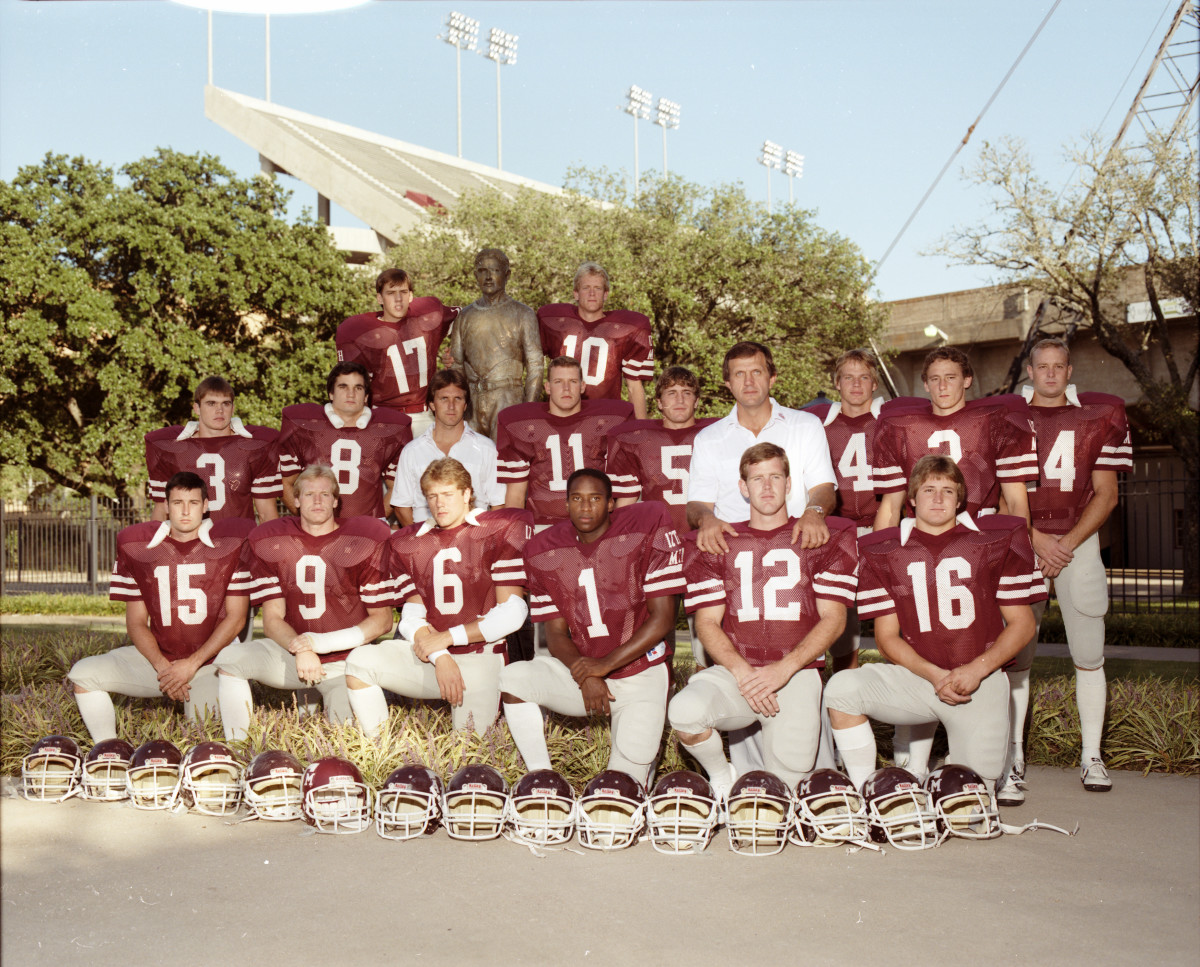
"Coach [was giving] us an opportunity to play," Stevens said. "And what we did with that opportunity was going to be up to each of us. That mindset of personal responsibility resonated with all of us. The opportunity to play above our pay grade forced us to stretch and reach for [higher] personal potential."
Stevens made the cut — though he admitted barely — for Sherrill's inaugural kickoff team. His name was the last listed on the roster, but that didn't make it any less exciting, especially because of the last-second nature of his decision to try out.
"I immediately went to a pay phone," Stevens said. "I told my parents the good news and graciously, the United States Army saw fit to give me one more semester at Texas A&M. I was so excited, but I was scared to death. I didn't know what to expect."
Apparently, neither did Sherrill's staff. A plan that 'out-of-the-box' had to have been well thought through, right? The answer to that was also apparently not.
"When I came back the next morning and told the staff, they didn't think I was rational," Sherrill said with a wry smile. "Matter of fact, R.C. looked at me and said 'Coach, I think you fell off your chair.'"
Slocum's reaction was rightfully cautious. A group of walk-on students facing off against bona fide scholarship athletes from other colleges in the most violent part of an organized football game just sounded far-fetched.
But no matter how it sounded, it worked.
"It worked great, actually," Sherrill said. "I just wish I had been smart enough to take time to know how important it was. The students that made up the 12th Man [Kickoff Team] took the football team to the student body, and they brought the student body to the football team."
In the five years of the team's existence, Sherrill's kickoff squad only allowed 12.5 yards per return on average, leading the country twice and finishing top five the other three times. It never allowed a touchdown, and he'd tell you personally that he hardly remembered opponents reaching the 50-yard line.
It was a national spectacle in every sense of the term. Sports Illustrated even ran a six-page spread on it leading up to what was going to become the squad's debut.
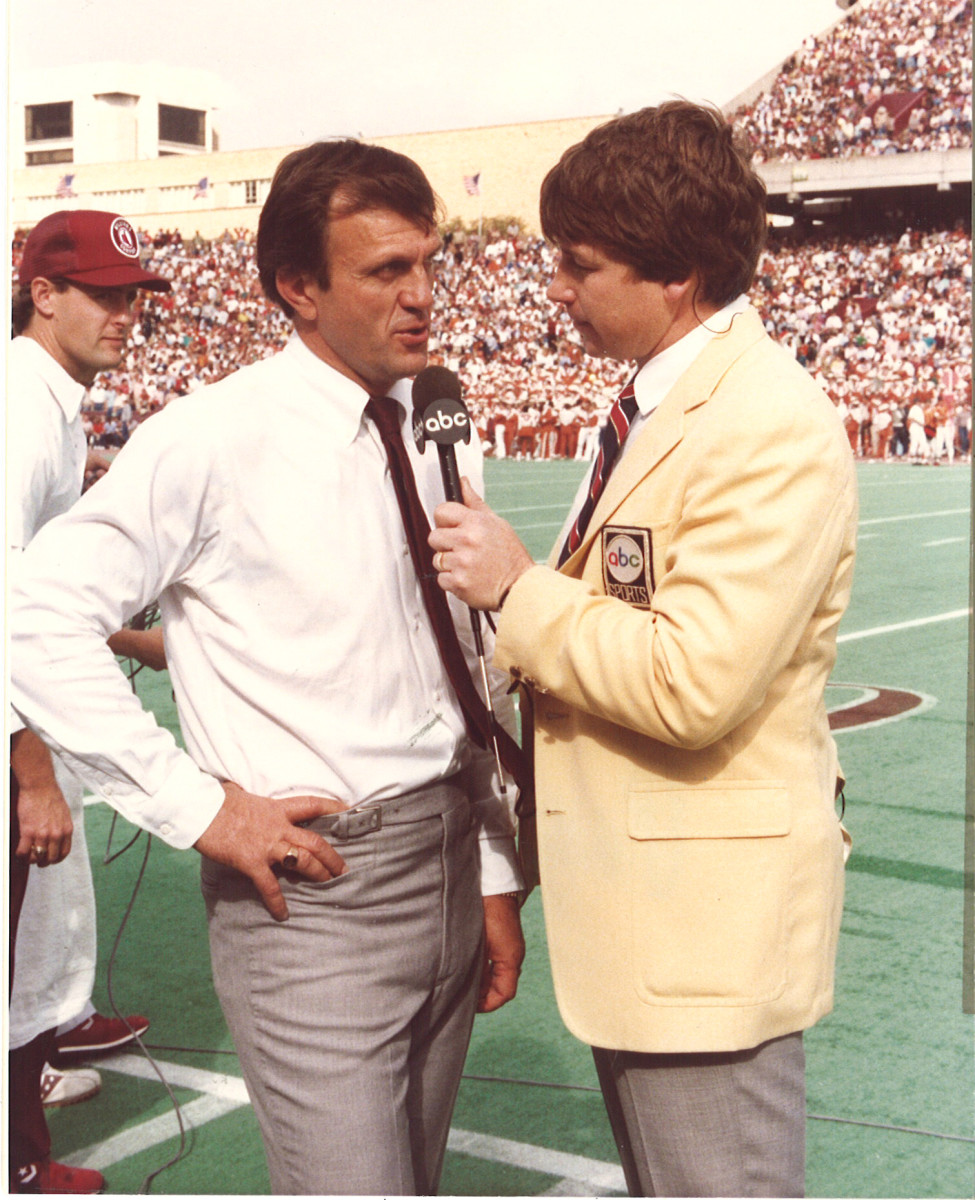
"It took a lot of guys that probably weren't good enough to play all the time, but with a lot of courage and desire, they could cover a kickoff," former Aggies coach Gene Stallings said. "What a great idea. I wish I could have thought of it."
Simply put, Sherrill knew what he had, and that just made his confidence even greater, even acknowledging the stakes during the Aggies' weekly press conference prior to facing Cal Berkeley in their 1983 season opener.
"If California returns the opening kickoff for a touchdown, I'm going to have a lot of people throwing darts at me," he said prior to the game.
The 12th Man Kickoff Team didn't allow a touchdown on that opening drive, and even stopped the Golden Bears' return man short of the 20-yard line multiple times, though the team couldn't quite get the job done, falling 19-17 in Game 1.
All of a sudden, the Aggies' kickoff team was making national news for what it was able to accomplish. But the players were also becoming mini-celebrities on campus, even years into Sherrill's "experiment."
Safe to say, Carpenter enjoyed the extra attention he was receiving.
"With the student body, we were rock stars," he said. "The students loved it in every way. When we would go to the Dixie Chicken (one of the still-popular bars found at Northgate on Texas A&M's current campus) or wherever we were recognized and cheered for.
"There were sometimes more signs with our names on them than there were for some of our regular players."
The fame and attention Carpenter and his buddies received wasn't enough to create rifts in the locker room, but the walk-ons that made up Sherrill's kickoff squad did have a reputation surrounding them.
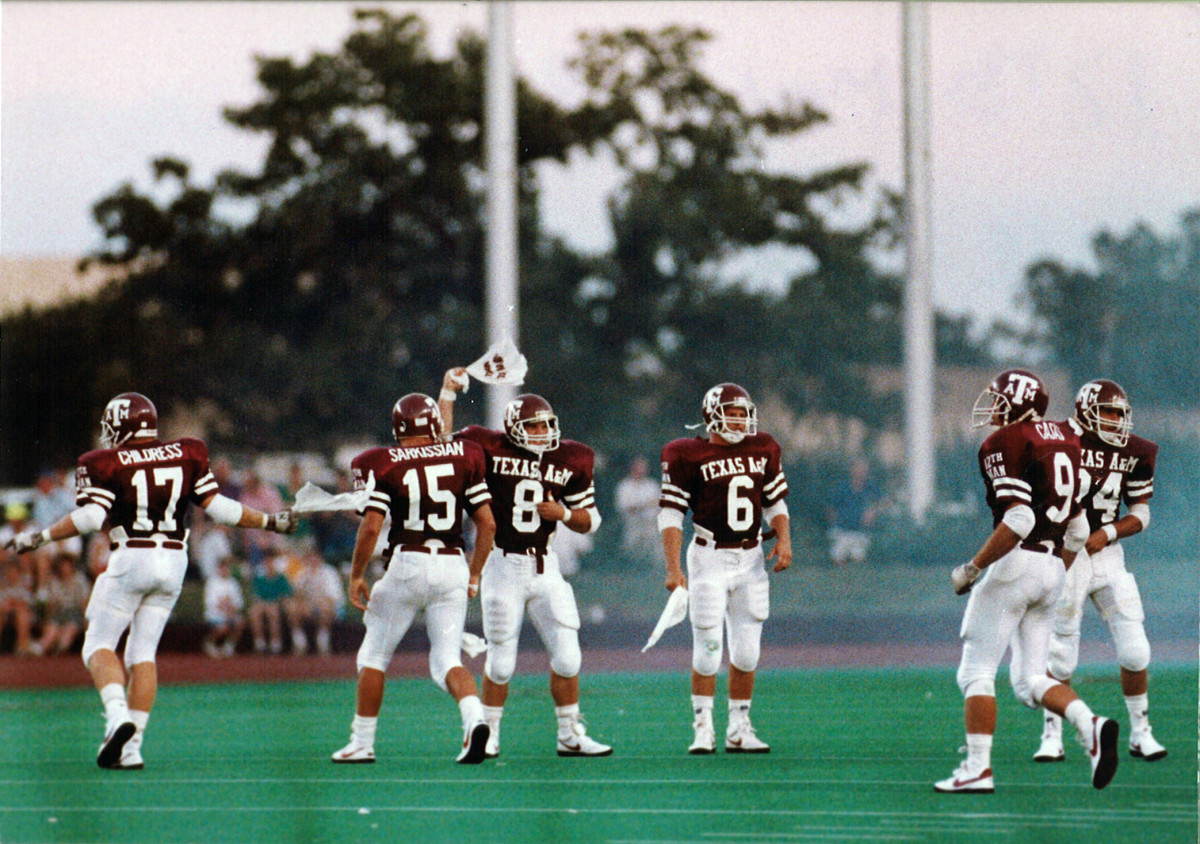
"Most of the scholarship guys said we were just 'crazy'," Carpenter said. "The 12th Man Team members came out 30 minutes prior to every practice to do hitting and open-field tackling drills ... which earned us the respect of our teammates. When they came out of the tunnel to the field for practice they would watch and cheer us on.
"He made Kyle Field the best home-field advantage in the nation. He brought the student body out of the stands and onto the field through us."
The cheering might not have continued too much longer after some of the scholarship players began to get injured during hitting drills by the walk-ons — which Carpenter says led to Sherrill banning the practice — but it was there.
And Sherrill was the man behind it. Behind the idea, vision, and camaraderie.
"The bottom line was we chose to play football for Texas A&M," Stevens said. "And Jackie Sherrill handed us the opportunity of a lifetime."
But as much as Sherrill was able to accomplish on the field with his unconventional ideas, he was also able to instill that in his players off of it.
That, they'd talk about all day. Literally.
Becoming 'The Aggie Coach' On and Off the Field
Jackie Sherrill was a phone caller.
That was very apparent to just about anyone who was close to him. And while it was true that he got to know his players extremely well on the field during three-a-day practices or — for the 12th Man Kickoff Team — in the 30 minutes before and after practices, it took more than that to truly "know" each of his players.
And for a coach as seasoned as Sherrill was, that was a big ask. But he did it anyway.
"[Sherrill] had this extraordinary ability to connect with each of us," Stevens said. "I [went ahead] and calculated this. There's roughly 3,000 or so players [that he coached]. And he called everybody by name."
To accomplish a goal like that for Sherrill meant connecting with his players outside of football. Unfortunately for him, that often came in the form of comfort through hardship.
But again, he did so anyway. Because that's when his players needed him most.
"I remember when my father died in 2012," Stevens recounted. "I was extremely close to my dad, and I was very devastated. After the funeral, I went to Salt Lake City to spend some time with my in-laws and my wife. And Coach Sherill called me."
"[It had been] 29 years after the fact, [But] he chatted with me and encouraged me," he added. "He consoled my broken heart for two solid hours [and[ gave me the greatest gift possible: his time. I often joke that I'm Coach Sherrill's favorite ... and truthfully, it feels that way.
"Coach always had this remarkable way of making each of us feel unique."
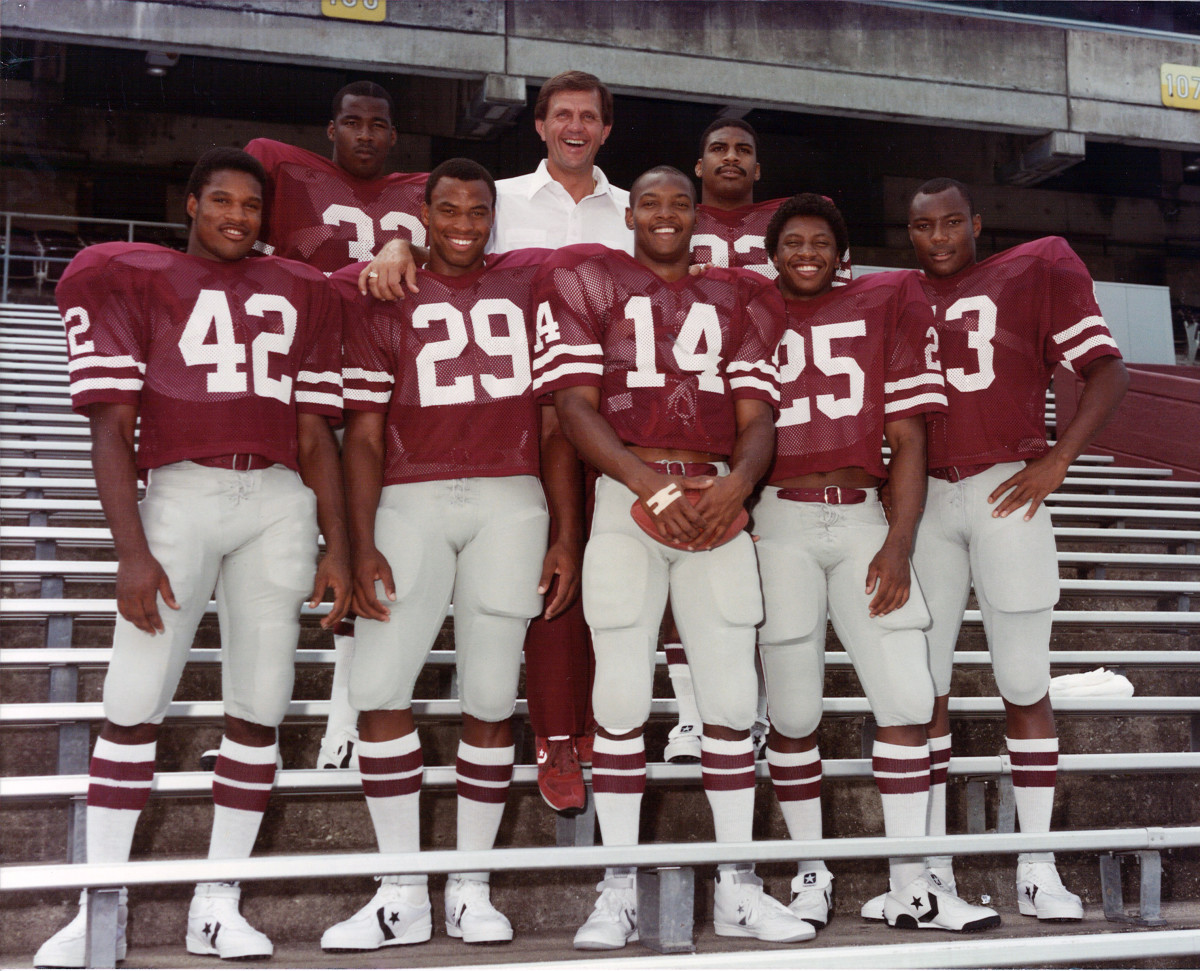
Sherrill radiated that uniqueness. It was a part of the way he recruited, a part of the way he coached, and a part of the way he listened to his players and their families — something that wasn't always the case.
No matter who he talked to, Sherrill made sure they were heard.
"Education was always important and a priority in our household," Former Aggies offensive tackle Richmond Webb said, recalling his recruiting process from Sherrill and Slocum. "Coach Slocum did a good job of preparing Coach Sherrill for 'Mama Webb' and what her expectations were. He did such a good job, in fact, that by the end of the night, she asked Coach Sherrill 'Are you a minister?'"
Webb went on to play for the Aggies and in the NFL — being named to the league's 1990s All-Decade team — and made a name for himself. But no matter how far he got, he always recalled his first encounter with Sherrill before he even took the field at Kyle Field, which was something players from all walks of his era remember vividly.
"One of the greatest things about Coach Sherrill is how personal he is," Carpenter said. "He wants to get to know you. He was definitely a player's coach, and we were his family. ... Sherrill was so intense on the field both during practice and games, but even with that intensity, he was always approachable."
"He always told us that coaches don’t win. Players win," Carpenter added. "He said his job was to make sure we were prepared for every situation before we hit the field. He was different from all the coaches I'd ever had, and he’s my favorite coach because of the relationship we built. He believed in me from Day One."
But whether it was Day One or Day 1,000, Sherrill was there. He had already become "The Aggie Coach" on the field for his radical ideas and abounding success, but he was working to hold the same title off of the field, too.
And for Smith "Wally" Hartley's family, he was exactly that and more.
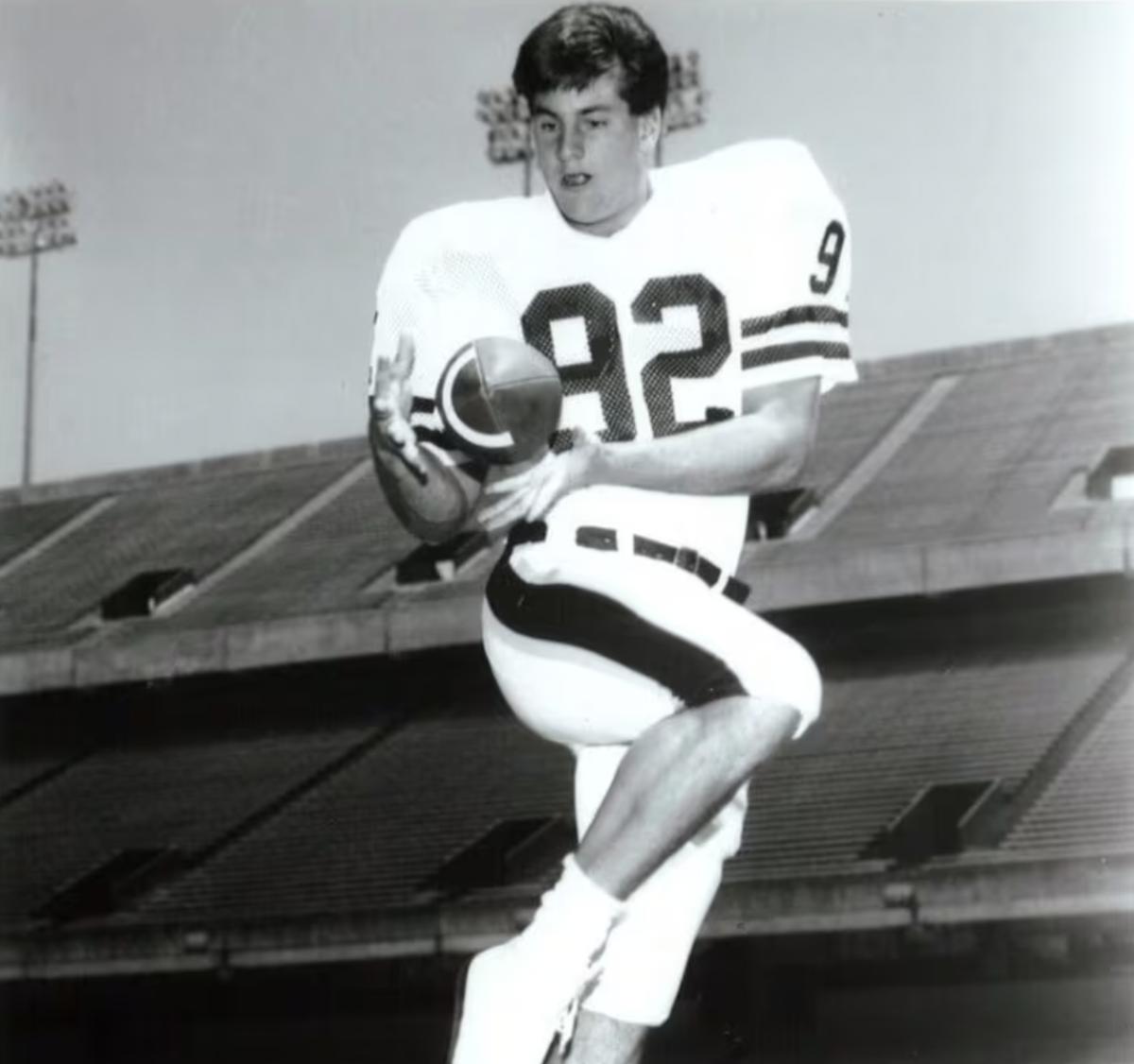
Hartley played tight end for the Aggies during the same timeframe as Carpenter, even catching a two-point conversion during their 1988 Cotton Bowl victory over Notre Dame. But years after bidding adieu to football, Hartley was diagnosed with glioblastoma.
"[Smith] got brain cancer and sent out a message on Facebook," Hartley's wife, Dianne, said. "When he did that, one of the first calls he got was from Coach Sherrill."
The phone call wasn't terribly long, but it left an impact on Dianne and Smith. It was the first time they'd heard from Sherrill since he'd played for him all those years ago, but he still showed that he cared. And that was the first time Dianne interacted with him.
The second time was much more personal, occurring later on during her husband's treatment, which brought the couple to Seattle for the remainder of his time.
"[Sherill] came to our door in Seattle," Dianne said. "My husband was [then] terminal. Sherrill showed up with a bunch of players that had all come to surprise [Smith]."
"We were sitting there with all these players together," she added. "They were telling war stories, and I was enjoying it thoroughly because these very accomplished men who Jackie helped foster, they became like boys with him in the room."
As special as it was for Dianne and Smith, however, it was bittersweet for Sherrill.
"Coach was sitting on his phone like a little 13-year-old girl," Dianne said. "That surprised me, [so] I turned to him and said 'Coach, can I get you something to drink?' He said no, but I looked up and he had tears in his eyes."
While sitting and listening to his players talk about their experiences playing with each other — and for him — he was watching the funeral of another former Aggie quarterback, David Beal, who died from the same condition that Smith had.
"After that point, Coach Sherrill almost adopted us," Dianne said. "He would call Smith to check in on him, and when Smith couldn't take those calls anymore, he was calling to check on me. He talked to me about death. He was one of the few people who actually did."
The relationship between Sherrill and Dianne only grew as Smith lived out the rest of his days, and continued even after his death. Sherrill was able to leave a lasting impact on both her and his former player simultaneously like he had to so many others before — 3,000, to be exact. That's how he became "The Aggie Coach" off the field.
"My husband always said Sherrill was a player's coach," Dianne said. "He learned so much from both the locker room and on the field. Coach raised some fantastic guys."
Sherrill's impact had been made, but his legacy didn't end when he resigned as the Aggies' football coach. It still had plenty of room to grow.
R.C. & Me: Creating A Lasting Legacy in Aggieland
Jackie Sherrill's tenure at Texas A&M ended in scandal.
It had been seven seasons, and in those years, the Aggies took home three straight conference titles, two 10-win seasons, and — to some — most importantly, five wins over the Texas Longhorns.
After an NCAA dispute led to two years of probation for the Aggies, Sherrill resigned, and his position was taken over by Slocum. But there wasn't any bad blood between the coach and the school — nor Slocum — as Sherrill's defensive coordinator merely extended the success that he had started.
"R.C. took over and I think we beat [Texas] 9-of-10 times [between the two of us]," Sherrill said. "But they weren't just wins. I can say this: 'We kicked their a**.'"
Sherrill came into a program that hadn't truly known winning before and made it almost a standard. He only had one losing season — his first one — while he was in College Station and made the Aggies' notorious rivalry against the Orange & White seem more like a one-sided affair.
That was special for him, his players, and the school. But still, there was always more.
"[Coach] taught his players more than X's and O's," Texas A&M Chancellor John Sharp said of Sherrill. "He taught them about life. ... One of the things that impressed me most about Jackie when I was watching him coach was after the football games. He would take those kids to the hospital and let him go through the rooms and shake hands with people.
"He taught him those kinds of things. That's what's going to be remembered."
Sharp was right. Over 30 years after his tenure in College Station was over, Sherrill is still a walking legend on campus. His legacy, in a way, is The 12th Man of Aggieland.
"Coach Sherrill made his mark on [so many] lives," Carpenter said. "And there isn’t one of his 12th Man Kickoff Team members who wouldn’t step up and do anything for him if given the opportunity. He gave us a lifetime of moments and memories."
That's why, when the second quarter came around during the Aggies' final home game of their 2023 campaign, the school decided to honor Sherrill — the Texas Sports Hall-of-Fame's latest initiate.
It did as best it could to re-live those memories for a packed Kyle Field as Carpenter and several other of Sherrill's former players and family joined him at midfield.
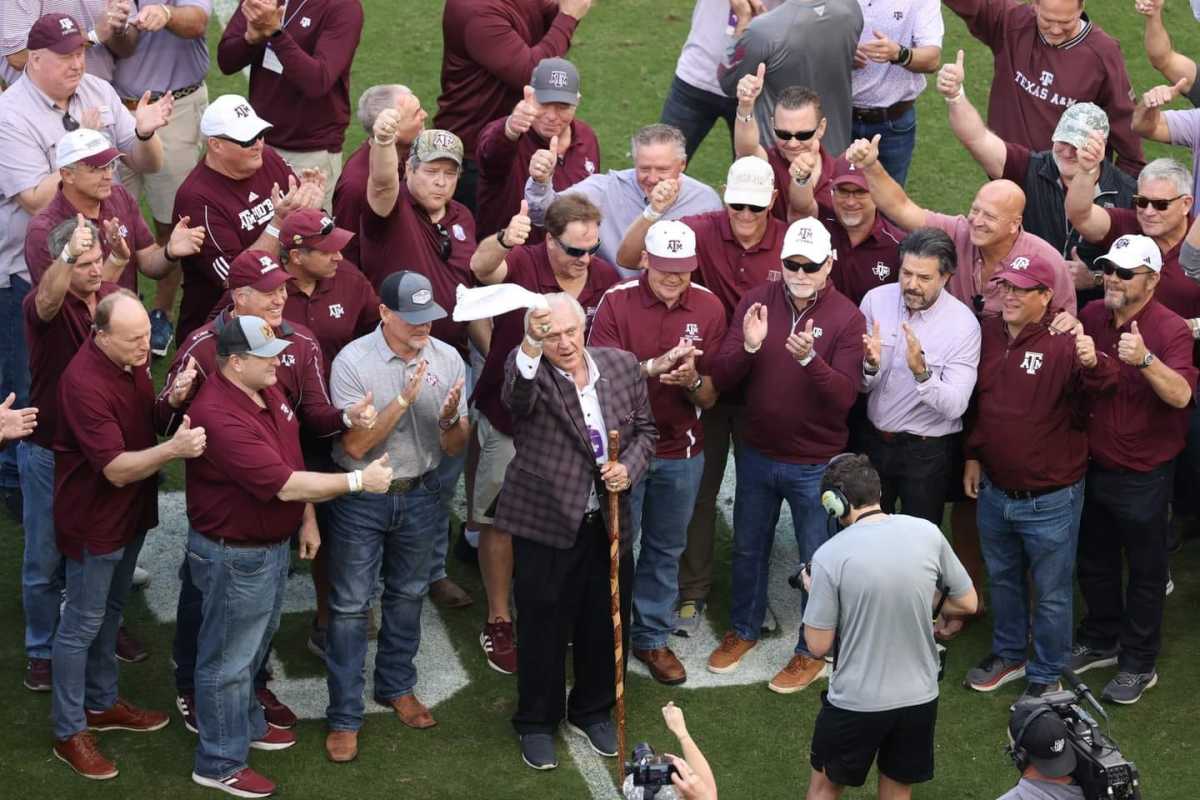
It's also why the Aggies rolled out a modern-day version of the 12th Man Kickoff Team.
With 5:25 left on the fourth quarter game clock at Kyle Field on Nov. 18, Texas A&M's senior 12th Man, Sam Mathews, stood at the 35-yard line with 11 other walk-ons.
They felt all the pressure in the world. In just a few seconds, they'd make their way down the field at full speed and cover the most important kickoff of the game.
The most important one ever.
Sherrill was watching, as were the other 12th Man Kickoff Team members of the past. It was Mathews' squad's responsibility to put their bodies on the line and make sure Abilene Cristian's returner did not reach the 20-yard line. They'd make sure of that.
So, as the kickoff sailed through the air, all 11 players, with rally towels in hand, made their way full speed down the field to meet the Wildcats' return man.
And they forced a fumble.
#12THMAN KICKOFF TEAM BRINGIN' THE HAMMER 🔨 pic.twitter.com/HwZvqGhbRh
— Texas A&M Football (@AggieFootball) November 18, 2023
“That’s what it’s all about, man. How awesome was that?” Aggies interim coach Elijah Robinson said following the game. “Those guys will remember that for the rest of their lives. I’m sure their family will. I’m sure the crowd will. The 12th Man, to me, is what it means to be an Aggie. They showed it right there."
Mathews himself was a walk-on — as the tradition goes for No. 12 in College Station — and Robinson was right. He would remember it for the rest of his life.
He and the entire squad.
“Being a walk-on, obviously me and the other walk-ons have a lifelong bond that not a lot of people will share,” Mathews said. “They put in the same work, but don’t get the same recognition so I was blessed to be out there and lead them and just get the opportunity to watch them do the thing they’ve been working their tail off [to do]."
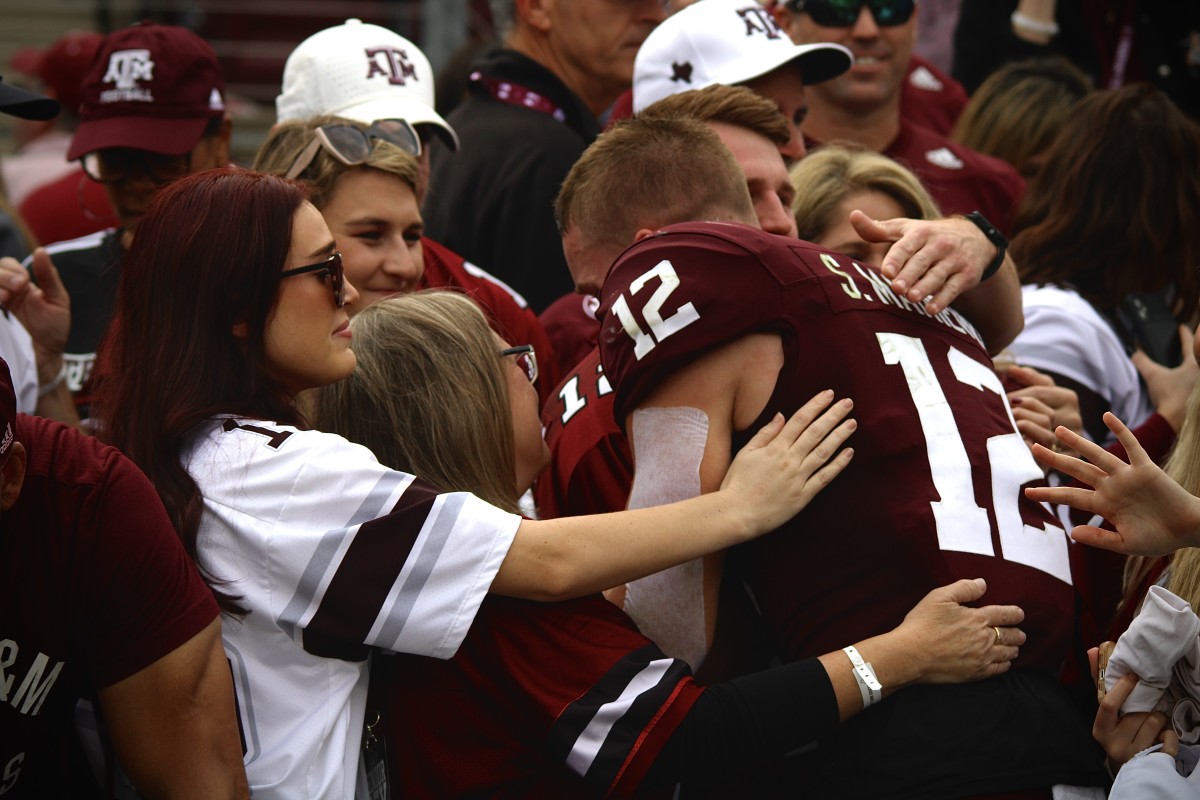
The fumble didn't count. After review, the referees labeled the returner down by contact, but for Mathews and company, that didn't matter. They had forced the fumble, and that's the story they'll likely roll with for years to come. Just like Stevens and his buddies did every time they saw each other.
When they became "like boys."
"It's funny," Stevens said. "I was looking at the guys I played with so many years ago, [and] it just seems like yesterday. Coach Sherrill gave us a golden opportunity, and I don't think I would be bragging if I said we all took that opportunity and made the most of it. It was amazing. It still sticks with each of us, even today."
As Sherrill watched Mathews and the modern-day 12th Man Kickoff Team, he was reminded of his time at Kyle Field. The time he spent coaching — sometimes three times a day — teaching and learning. The time he spent with Stevens. With Carpenter.
With Slocum. Immersing himself in Aggie culture and Aggie traditions. He, too, will forever remember his time spent in Maroon and White, though not just for the football.
"People always ask which place I coached at is the best ... which one I liked most," Sherrill said. "It's not the place — although, this is a special place. It's about the players.
"You spend an awful lot of time [with them], and I can tell you very honestly and openly that I was cussed at a lot by the players leaving practice. I wasn't easy on the players, but how they turned out ... [it] makes me feel honored. It is an honor."
As honored as Jackie Sherrill was to coach at Texas A&M, the university was honored to watch him do it. For seven years, he led one of the most talked about programs in the country and did so in a way that earned him the utmost respect and love from his players.
Sherrill was a phone caller, a mentor, a shoulder to lean on, and a rambunctious coach with out-of-the-box ideas. But he was also an Aggies coach. He was a bridge for The 12th Man and the embodiment of "Good Bull" Aggie football. That was Sherrill.
That's the Sherrill who left a forever mark on all who played for him, and who still continues to do so. He forever changed Aggieland, and in the process, it changed him.
That's the story of Jackie Sherrill — a true Aggie legend and Texas A&M hero.
"There is nothing that any of us can do to truly give back to Coach Sherrill as much as he has given to each of us," Carpenter said. "But all of us would die trying if asked.
"We are all in debt to him."
